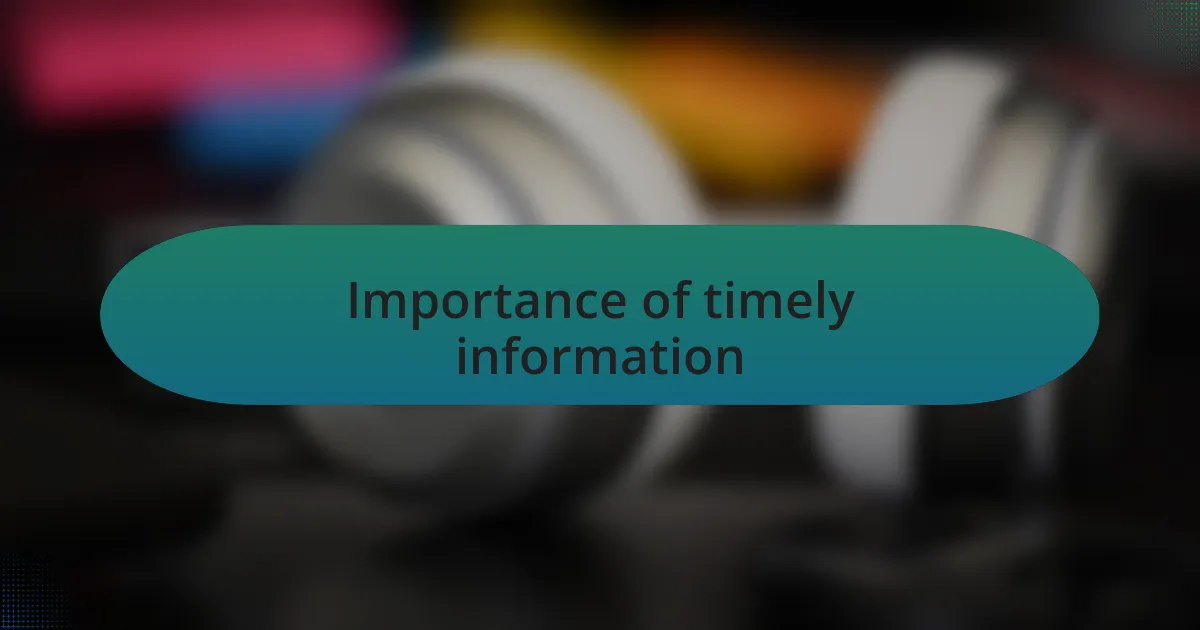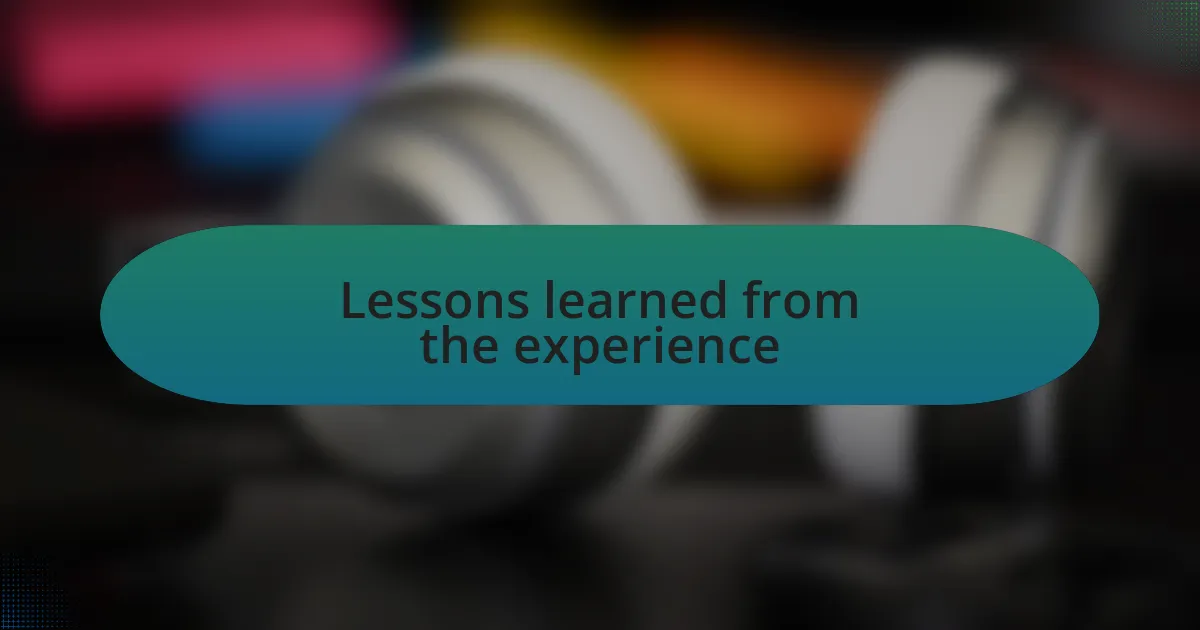Key takeaways:
- Audio news aggregators provide personalized, convenient access to timely information, enhancing productivity and engagement.
- Listening to audio content facilitates understanding of complex market trends, reducing anxiety and promoting informed decision-making.
- Emotional resilience and diversifying information sources are crucial lessons learned from navigating market fluctuations during crises.
- Actively engaging with audio content, curating reliable sources, and timing consumption are key strategies for effective use of audio news.

Understanding audio news aggregators
Audio news aggregators are platforms that collect and curate news from various sources, delivering it in an easily accessible audio format. I remember the first time I used one; it was like finding a hidden treasure trove of information, all narrated to me while I was on the go. Isn’t it fascinating how technology can transform our daily routines?
One of the most appealing aspects of these aggregators is their ability to tailor content to individual preferences. I often wonder how they manage to know what I want to hear—whether it’s the latest economic updates or human interest stories. The algorithms behind these services are not just complex; they are deeply intuitive, creating a personalized audio experience that feels almost like having a conversation with a friend who knows my interests.
Moreover, the convenience of audio news cannot be overstated. I’ve had days where multitasking felt overwhelming, but simply pressing play on a news article allowed me to stay informed without sacrificing my productivity. Have you ever found yourself wishing to absorb information while commuting or exercising? Audio news aggregators address that need perfectly, making it easier to stay engaged with the world around us.

Importance of timely information
Timely information is crucial, especially during market fluctuations. I recall checking my audio news aggregator during a particularly volatile trading day and feeling a sense of urgency as I listened to the latest updates. The ability to receive real-time insights made me feel more in control of my investment decisions.
When I think about those moments, it’s clear how important it is to have access to current information that can influence my next move. One evening, I heard a breaking news segment about a company I was considering investing in. It prompted me to pause, reassess my strategy, and ultimately avoid a potentially poor choice. How often do we make decisions without the full picture? In my experience, it’s far too easy to miss critical information if you’re not tuned in.
There’s a certain peace of mind that comes from being well-informed. I remember feeling anxious during the downturn; however, the timely updates from my audio news aggregator provided clarity and understanding. Having access to accurate information as events unfold has taught me that staying informed isn’t just about knowledge—it’s about empowerment.

Analyzing market trends through audio
Sound is a powerful tool for analyzing market trends, especially when the visual chaos of charts and graphs can be overwhelming. During the market crash, I often found myself tuning into audio segments that broke down complex data into understandable insights. Listening to experts explain shifts in market sentiment not only clarified my understanding but also helped me remain calm amid the uncertainty.
One evening, as I drove home, I caught an insightful podcast episode discussing macroeconomic indicators. The host described how employment data could influence stock prices. That audio piece struck a chord with me; it made me realize how interconnected those trends are. Do we always consider how external factors play a pivotal role in our investment strategies? Reflecting on those insights led me to approach my portfolio with a newfound perspective.
In times of market distress, I’ve learned that audio can serve not just to inform but to comfort. There have been instances when I felt lost, but listening to reassuring voices of analysts reassuringly break down the news transformed that anxiety into a strategic mindset. The experience taught me that, rather than avoiding the noise, embracing it through sound can lead to more informed and confident decision-making.

How I used audio news
During the tumultuous days of the stock market crash, I turned to audio news platforms as my lifeline. The convenience of listening while I went about my daily routine allowed me to absorb valuable insights without the stress of screen time. I vividly remember a moment while jogging when I listened to an audio briefing that articulated the broader economic landscape; it felt like having a conversation with a trusted expert, making the information digestible and relatable.
On a particularly challenging day, I tuned into a live audio session featuring industry analysts dissecting market volatility. Their candid discussions reminded me that I was not alone in navigating these choppy waters. Hearing their perspectives on market psychology sparked a realization—how often do we underestimate the power of community in our financial journeys? This engagement through audio made me part of a larger discourse, helping to quell my fears and fueling my determination to think strategically.
I found myself often reaching for audio updates during moments of uncertainty, turning to well-known financial podcasts that offered not only analysis but also heartening stories of resilience. I haven’t just learned about market metrics but discovered narratives that resonated with my own experiences. When I heard how other investors were grappling with their challenges, it inspired me to face my uncertainties with a fresh mindset. Isn’t it incredible how audio content can connect us during our most isolating times?

Lessons learned from the experience
One critical lesson I learned from navigating the stock market crash is the importance of emotional resilience. I recall feeling a wave of panic wash over me when I first saw the numbers drop. But rather than reacting impulsively, I took a step back and reminded myself to breathe. This pause enabled me to regain my composure and reassess my strategy with a clearer mind. I realized that our emotions can cloud judgment; understanding this has changed how I approach future market fluctuations.
Listening to various analysts discuss their own emotional responses during the crash was enlightening. One analyst shared how he adapted his strategy based on lessons learned from previous downturns. I related to his story—it was as if he was holding a mirror to my own experiences. This connection highlighted a valuable insight for me: sharing our vulnerabilities not only validates our experiences but can also reshape our investment mindset. Have you ever noticed how a story can help you process your own feelings?
I also recognized that diversifying my sources of information was vital. After the crash, I made it a habit to seek out various perspectives from different audio outlets. There were times when I felt overwhelmed, yet each new voice added a layer of understanding to my decision-making process. This experience reminded me that having a variety of viewpoints is essential for a well-rounded approach to investing. Isn’t it fascinating how one lesson can shift our entire perspective on our financial journeys?

Tips for using audio sources
When using audio sources, I find it essential to actively engage with the content. Instead of passively listening, I take notes during key moments or whenever a compelling idea strikes me. This practice not only reinforces my understanding but also gives me something to refer back to later. Have you ever considered how writing down thoughts while listening could enhance your retention?
Another tip is to curate your audio sources carefully. I’ve experienced the difference between tuning into a well-researched podcast and stumbling across a less credible talk. Shifting my focus to trusted analysts and reliable platforms significantly improved the quality of information I received. It’s like choosing the right ingredients for a dish; quality truly matters in what you feed your mind.
Finally, I’ve learned the value of timing when consuming audio content. During market volatility, I adjust my listening habits based on the news cycle, seeking updates during key hours when market shifts are most likely to occur. I often find that being tuned into live discussions or expert commentary during critical moments can provide insights that written summaries might miss. How do you stay plugged in when everything feels like it’s changing in real time?